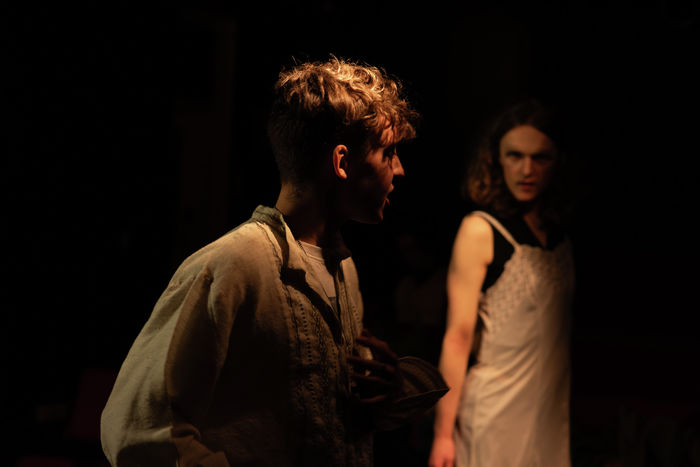Still Life is a subdued triumph
Strong performances and attention to visual detail are the standouts in this production

We all know the plot of Still Life, even if we don’t realise it. Noël Coward’s one-act drama, sporting more meat on its bones than his typical comedies, is a series of vignettes contained entirely within Myrtle’s (Holly Varndell) railway station café. Here, we witness the fleeting love affair between housewife Laura (Lucy Brougham) and physician Alec (Rafael Griso Dryer), both of them well-to-do… and married to other people. They meet, fall in love, fall out, and, in the play’s climax (though that’s somewhat of a misnomer), they discreetly bid goodbye to one another, encircled all the while by the bustling traffic of the world around them.
Sound familiar? That’s because it was the prototype for 1945’s Brief Encounter, which launched the career of director David Lean, made a household name of Celia Johnson and, in 1999, was ranked by the BFI as the second-greatest British film. Ever. This production has big shoes to fill, not only in squaring up to the Lean masterpiece (a connection amped up in the show’s publicity) but, for directors Stephen De Bank and Elly Na, in making the right casting decisions.
“The play mines poignancy from understatement, and melodrama from restraint”
Still Life is Coward’s tribute to the British stiff upper lip. It’s proto-Pinter: Alec and Laura betray little of what they feel, up until moments where they can no longer contain themselves. The play mines poignancy from understatement, and melodrama from restraint. Consequently, despite its short length, it’s a challenge for student theatre because too often Cambridge thespians resort to ‘big’, showy styles of acting and, in the worst cases, shouting-as-performing. Granted, there’s little in this script to make fireworks from, but student theatre can always tilt towards the other extreme: coy ‘understated’ gestures, grating vocal inflections which come across as smug and affected; in short, ostentatious subtlety. De Bank, Na and their well-chosen cast triumph by largely side-stepping these pitfalls. Characters are rendered in all their world-weariness, and, where Alec and Laura are concerned, they capture that uniquely middle-aged kind of ennui and dissatisfaction with life which is crucial to securing the audience’s sympathy.
Take, for example, Griso Dryer’s phenomenal performance as Alec. Contained and knowing, when he pushes Laura for an affair and codes it as an act of ‘courage’ he speaks with the same manner-of-factness as if he were addressing one of his patients. Brougham, meanwhile, plays Laura as more flustered and flappable. This works because it reminds you of Alec’s observation that “I don’t think of myself as an adult, really” (or something like that): Laura feels young at heart, chained to adult obligations. Where Brougham truly comes into her own is in moments where this irritability proves to be a mask – and slips. “Loving you is very hard for me,” she tells Alec in one scene, her face furrowing and close to tears. You can practically hear the faucet creaking, and yet she denies us any waterworks. It’s a delicate, technically sophisticated piece of acting that gets right at the core of the play’s feeling.
“You can practically hear the faucet creaking, and yet she denies us any waterworks”
There are some excellent peripheral players too: Holly Varndell, especially, is magnificent as the caustic Myrtle (a character who desperately needs her own spin-off). Right down to the anxious tap-tapping of a glass, Varndell is an actor who can sink their claws into a juicy side character and mine their brusque drollness for all it’s worth. The Playroom stage is gorgeously adorned, complete with a fitted counter, ornate glass and china kept behind cupboards, and baskets loaded with apples and scones. The set design, by Ciara Avis and Megan Kruger, is outstanding. It does, however, become a little precarious, as characters are made to navigate a delicate performance space filled with shaking crockery and glasses, and carefully gowned furniture.
This has the effect of slowing down some of the action on stage, which could have been a little slicker. Had the play’s traffic been better-oiled (I’m extending this to some of the tech cues, too) then it might have better achieved the resonance Coward was going for. Still Life situates Alec and Laura’s relationship within the hustle and bustle of other people’s lives (hence it’s a ‘still life’ – a snapshot), and when navigating such a tight, ornate space, the play’s simultaneity becomes a little stunted. This is crucial for the finale, where the lovers’ goodbye is spoiled by the arrival of an unwitting friend and their lives, trampled by other obligations, return once more to the mundane.
There’s this, and the fact that the play, like its central romance, is all too short. In the same vein, though, it’s worth experiencing for its emotional richness – and the brief escape it offers from the travails of life right now (by which, yes, I’m referring to exams).
Still Life is showing at the Corpus Playroom from Tuesday 14th to Saturday 17th May, at 7pm.
 Comment / Cambridge’s tourism risks commodifying students18 April 2025
Comment / Cambridge’s tourism risks commodifying students18 April 2025 News / Varsity ChatGPT survey17 April 2025
News / Varsity ChatGPT survey17 April 2025 News / Cambridge researchers build tool to predict cancer treatment success19 April 2025
News / Cambridge researchers build tool to predict cancer treatment success19 April 2025 News / Cambridge researchers find ‘strongest evidence yet’ of life on distant exoplanet18 April 2025
News / Cambridge researchers find ‘strongest evidence yet’ of life on distant exoplanet18 April 2025 News / Greenwich House occupiers miss deadline to respond to University legal action15 April 2025
News / Greenwich House occupiers miss deadline to respond to University legal action15 April 2025






